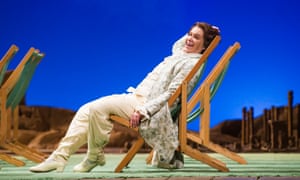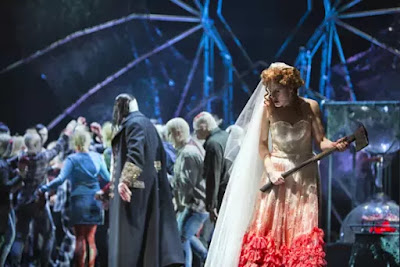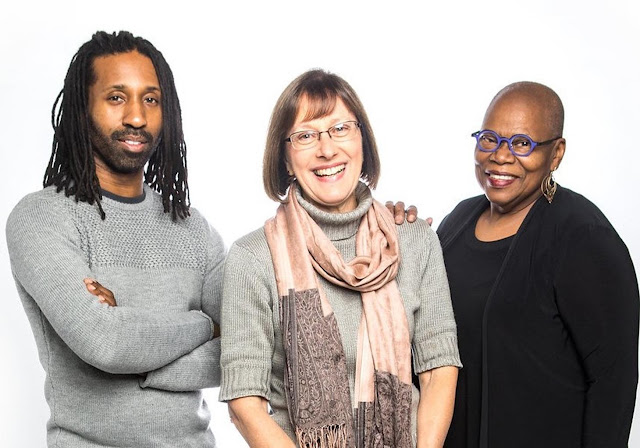This is a list, and you know I love lists. These 10 operas are all operas which I had never heard before I began blogging and have never seen a second time. All stand out in my mind as outstanding memories. None of them came to me by way of the Met and none are even close to the top 100. I have listed them in order of their premier dates. They cover the entire history of opera, and all of them deserve to be revived IMHO.
 Francesco Cavalli's La Calisto
Francesco Cavalli's La Calisto (1651) in Italiian. The musical style is late Monteverdi. I acquired this from a pirated source in a production that involved René Jacobs. I understand there is a legitimate DVD of this production that with some effort might be acquired. This opera production seems to try to show us a true Venetian opera production with gods who descend through stage machinery and transform from baritones to sopranos. I loved it for its sense of fun. Venice is the land of carnival so entertainment is the order of the day. To present this opera you would need a baritone with a fabulous falsetto.
Jean-Philippe Rameau's Comédies lyriques Platée (1745) in French. The musical style is French Baroque. I saw this live at the Santa Fe Opera and thought it was great fun. Since we are in France, the title character cross dresses from a male tenor to a female, instead the usual Italian arrangement at that time which involved mainly sopranos. Maybe comedy is a theme for me. I think perhaps operatic comedy was more significant in times gone by. This plot is also about gods and magic beings. The title character is written for a French type of tenor called a haute-contre. To present this opera you might need one. He isn't falsetto.
Gioachino Antonio Rossini's Maometto Secondo (1820) in Italian. The musical style is early bel canto. This was also seen live at the Santa Fe Opera with marvelous performances by Luca Pisaroni, Leah Crocetto and the rest of the cast. It's a serious opera of great significance and an important political plot. It's one of the operas composed for Isabella Colbran. This needs to return, but to present it you might need someone who can be Isabella Colbran.
Heinrich Marschner's Der Vampyr (The Vampire) (1828) in German. The musical style is German romantic. I saw this live at the Komische Oper Berlin. Is it a comedy, a tragedy, a soap opera, a horror movie? What? So Germans aren't as serious as we thought. Who knew vampires were popular in the 1820s? Our heroine is also a modern girl who dares all and triumphs in the end. There's no cross-dressing. There are no vocal oddities here or particularly difficult roles. Present this in your local company.
Hector Berlioz's Benvenuto Cellini (1838) in French. The musical style is French romantic. This is from a DVD from Salzburg that just happened to be in the opera shop in San Francisco when I was there. The story takes place in Rome during carnival, creating many opportunities for frivolity. The title character is an actual historical figure, an artist from Florence who wrote a famous autobiography. His bust is on the Ponte Vecchio in Florence. The Pope is a character. Cellini gets into lots of trouble but always finds his way out. I see no severe difficulties with presenting this opera and don't think it has to be comedy. Of this set of operas this is the only one that appears in the Met On Demand.
Pyotr Ilyich Tchaikovsky's The Maid of Orleans(1881) in Russian. The musical style is Russian post-romantic. Perhaps the reason this opera is not popular is because it is in Russian. The Verdi Joan of Arc is more popular, but I think this one is a better opera. For one thing this plot is a lot less ridiculous than Verdi's. I saw it live at the San Francisco Opera and loved it. Joan is a mezzo. Is that the problem? The difficulty with presenting this opera would be finding a singer to be Joan. Dolora Zajick might not be available.
 Erich Wolfgang Korngold's Die Tote Stadt
Erich Wolfgang Korngold's Die Tote Stadt (1920) in German. In this list I think it is the closest to standard repertoire and would be classified as post-romantic or what I have called post-Wagnerian. I saw it live at the San Francisco Opera. I sat next to someone at the
Cosi HD who thought this was the opera she hated most. The more repulsive parts of the story suit the world view of the early twentieth century. Maybe you shouldn't revive this for your local company.
Gian Carlo Menotti's The Last Savage (1963) in English. Menotti's musical style is closest to American musical, but here he approaches bel canto. Modernism makes an appearance. I saw this live at the Santa Fe Opera. The plot most resembles a Tarzan movie. I don't know if you would want this without the production. The voice parts are not unusual, but you need a baritone who can pass for Tarzan. Try it.
Philip Glass's Orphée (1993) in French after the Cocteau film of the same name. In fact the dialog comes from the movie. The musical style is modified minimalism. I saw this live at Glimmerglass where they advised that you first see the movie. I did not. It seems the most like a real opera of Glass's operas. It is an angel of death plot, except the angel falls in love with a mortal and tries to cheat fate. I see no barrier to producing this opera.
Oswaldo Golijov's
Ainadamar (2005) in Spanish. The musical style is South American modernism. I saw this live in San Francisco presented by Opera Parallèle. It jumps the time frame a couple of times, a problem that was easily solved in this production by displaying the year in the super-titles. It is a biography of the playwright Federico García Lorca. The music is exciting and fun and incorporates dance genres. You will need dancers.
#ad

































